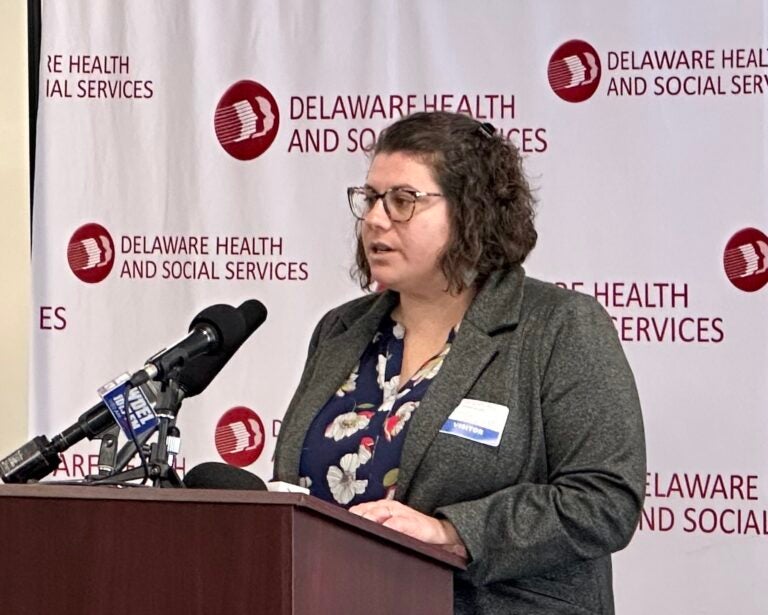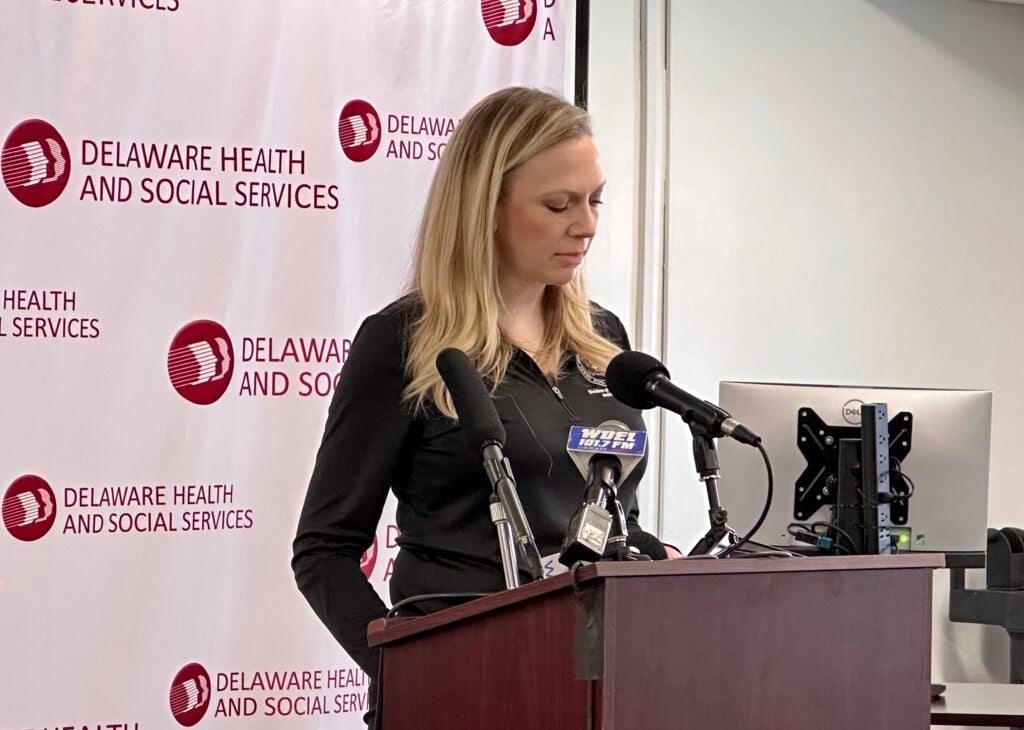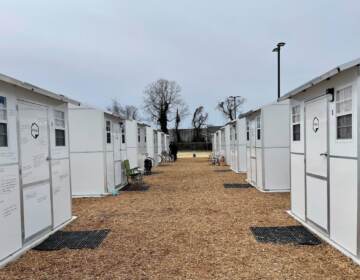Delaware groups work to connect the dots between substance use and homelessness
Today, the fourth community response addressed the health outcomes of substance abuse, highlighting housing as a common concern.

Rachel Stucker, executive director for the Housing Alliance Delaware, talks about the initiatives driving the organization's mission. She highlights the upcoming "Point in Time Count" event scheduled for the night of January 24th and the morning of January 25th. (Johnny Perez-Gonzalez/WHYY)
From Philly and the Pa. suburbs to South Jersey and Delaware, what would you like WHYY News to cover? Let us know!
How can Delaware best coordinate its efforts to address the state’s high rate of substance abuse and overdose deaths while helping those Delawareans experiencing homelessness?
That was the basis of a meeting of community advocates, state leaders, and the state Department of Health and Social Services.
Housing challenges are a common issue for those struggling with addiction or those in the process of recovery, said Joanna Champney, director of the Division of Substance Abuse and Mental Health.
“Reports from our behavioral health treatment providers indicate that when people enter mental health treatment in Delaware, 13% were totally homeless at admission. For people entering addiction treatment in Delaware, 7% were totally homeless,” she said. “When we broaden the scope to looking at people getting treatment who are not just completely homeless and on the street, but we also include those who are housing unstable, the percentage unfortunately gets even worse.”
The correlation between housing and substance use disorder is evident, she noted.

According to her statistics, 67% of clients benefiting from services funded by the federal Statewide Opioid Response Grant faced housing instability throughout the fiscal year 2023.
As a result, DHSS rolled out the Recovery Support Scholarship program in March 2021, allowing treatment providers to extend housing support to individuals in treatment facing emergencies. Following this, DSAMH promptly assesses and approves the applications.
“Using the recovery support scholarship, an addiction treatment provider can fund a seven-day hotel stay, a one-time, one-month rental assistance, one-time security deposit or one month of Oxford House rent,” Champney said.
In addition to that program, the state received two grants from the Prescription Opioid Settlement Distribution Commission, totaling $700,000. An additional $1.2 million has been secured from the Delaware Criminal Justice Council through the Comprehensive Opioid Stimulant and Substance Abuse Site-Based Program, which was allocated explicitly for housing support.
Through the “Projects for Assistance in Transition from Homelessness” or PATH, part of the allocated funds support street outreach and in-reach supportive services statewide.
“A total of 675 individuals were served with PATH services this past grant year. Of the 675 persons served, 263 were enrolled through Street Outreach Services, and 412 were enrolled through Supportive Service activities,” said Karen Record, chief of social determinants at DSAMH. “These clients received diagnostic screening case management and referrals including but not limited to temporary and permanent housing services placement, substance use treatment, mental health treatment, personalized social services physical health appointments, and healthcare insurance access.”
To further address substance use problems and overdoses, the state is launching “harm reduction” vending machines this spring. These machines will be available throughout the state and will provide items like Narcan to prevent overdoses.
“There’s going to be approximately five units distributed throughout the state and essentially those harm reduction vending machines allow people to walk up. It’s totally free, totally confidential,” said Champney. “The Narcan and the fentanyl and xylazine test strips will always be available. The other items in the vending machines will be available while supplies last from agencies who are partnering with us and donating those supplies.”
While the primary featured item is Narcan, the five machines will include necessary items like fentanyl or xylazine test strips, safer sex kits, pregnancy tests, and dental hygiene kits.
DHSS and organizational leaders say that frontline entities such as Horizon House, Brandywine Counseling, community services, and recovery innovations provide a strong foundation for addressing homelessness and substance abuse.
“Housing really is the anchor point for people to be able to think about their futures. If they don’t have a place to stay that night, if they’re unsure where they’re going to be in 30 days or 60 days, it really becomes challenging to think about your life as a continuum when you’re worried about right now,” Champney said.
She pointed to places like the Pallet Village in Georgetown in Sussex County, where people experiencing homelessness can find shelter in tiny homes, as an example.
“Great organizations like the Pallet Village from the Springboard Collaborative downstate, you know, they’re really leading the way and helping people envision a brighter future and giving those of us in the social service industry a mechanism to provide supportive services.”

At the end of Monday’s briefing, leaders repeatedly emphasized a call to action for Delawareans to become more involved in their community, whether through joining the field work, donations or advocacy.
“Housing really is the foundation of wellness”, said Rachel Strucker from Housing Alliance Delaware. “So a call to action that I’ll send to you all today, is to contact your local state representative or a local council member, make one phone call, send one email today telling someone that housing is important and we need to continue to take action on the affordable housing crisis in our state.”

Get daily updates from WHYY News!
WHYY is your source for fact-based, in-depth journalism and information. As a nonprofit organization, we rely on financial support from readers like you. Please give today.





